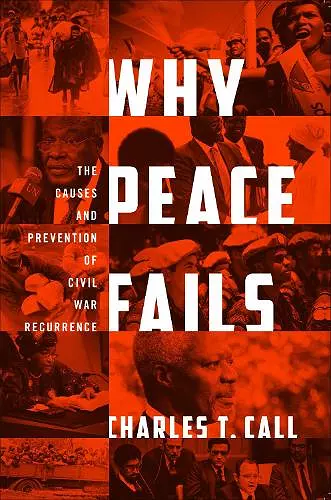Why Peace Fails
The Causes and Prevention of Civil War Recurrence
Format:Paperback
Publisher:Georgetown University Press
Published:3rd Apr '12
Currently unavailable, our supplier has not provided us a restock date

This book takes on one of the biggest policy problems facing policymakers today: internal armed conflicts have a nasty habit of repeating themselves and we don't really know why. Using a mix of quantitative analysis and numerous case studies, Charles Call carefully reveals the importance of political inclusion in preventing repeat violence, and in the process offers important and timely policy prescriptions. This will be required reading for anyone struggling to prevent and put an end to cycles of seemingly endless war. -- Barbara Walter, professor, Graduate School of International Relations and Pacific Studies, University of California, San Diego This important new book offers fresh insights into the failure of peace agreements that will be of great interest to scholars and policymakers alike. -- Chandra Sriram, School of Oriental and African Studies, University of London Countries that fall into civil war are likely to see future violence. Charles Call's impressive book-rich with theoretical insight and rife with empirical evidence-offers new evidence into precisely why that's the case. This carefully researched, accessibly written, and engagingly argued book underscores the essential ingredients of inclusivity and legitimacy; its findings and recommendations should be essential reading for students, scholars, and practitioners alike. -- Timothy D. Sisk, University of Denver Thoughtful and thorough, Why Peace Fails combines the systematic reasoning of a social scientist with the contextualized insight of a practitioner. Charles Call has drawn on his experience in both arenas and produced a study of what makes for success and failure in peace operations. It is well worth the closest attention of both scholars and policymakers. -- Michael W. Doyle, Columbia University Charles Call has written the next important statement on why some states that come out of a civil war trend toward peace while others return to violence. Bringing to bear a deep knowledge of existing theories of the causes of and solutions to civil wars and a rich understanding of a wide range of cases, Call makes a compelling case that political exclusion is an important but overlooked reason for cycles of violence. This is the sort of book that should be read and discussed by both scholars and practitioners. -- Michael N. Barnett, University Professor of International Relations and Political Science, The George Washington University
Why does peace fail? More precisely, why do some countries that show every sign of having successfully emerged from civil war fall once again into armed conflict? What explains why peace sticks after some wars but not others? This title examines the factors behind 15 cases of civil war recurrence in Africa, Asia, the Caucasus, and Latin America.Why does peace fail? More precisely, why do some countries that show every sign of having successfully emerged from civil war fall once again into armed conflict? What explains why peace "sticks" after some wars but not others? In this illuminating study, Charles T. Call examines the factors behind fifteen cases of civil war recurrence in Africa, Asia, the Caucasus, and Latin America. He argues that widely touted explanations of civil war - such as poverty, conflict over natural resources, and weak states - are far less important than political exclusion. Call's study shows that inclusion of former opponents in postwar governance plays a decisive role in sustained peace. "Why Peace Fails" ultimately suggests that the international community should resist the temptation to prematurely withdraw resources and peacekeepers after a transition from war. Instead, international actors must remain fully engaged with postwar elected governments, ensuring that they make room for former enemies.
Its clear structure, honest discussion of shortcomings, and mixture of methods - as well as its policy debates and recommendations - make this book an invaluable teaching tool. Indubitably, Call makes some signi cant theoretical contributions, important for scholars and practitioners alike, as civil war recurrences continue to occur. African Affairs Call cites sources that represent the most credible scholarly and professional works available. His research is rigorous, comprehensive, and compelling. It is well articulated and appropriately interwoven, with substantive depth and analysis. His conclusions and recommendations are sound and constructive ... a must-read for conflict theory scholars, academics in the fields of political science and international studies, and military and government leaders-especially those who shape US policy with fragile states. Military Review A systematic, engaging and critical account of commonly used theories and methodologies, while providing a deep understanding of a range of cases that display both the successes and failures of various peace settlements. Sicherheit und Frieden (Security and Peace) The book's most valuable contribution can be found in its final chapter where conclusions for policy and practice are discussed. The book closes with a sophisticated analysis of why legitimacy-building by external actors is so difficult, and an invaluable analysis of the four moments in postwar political processes. -- Clare Lockhart Governance An impressive, focused examination of a crucial question in the study of political violence. Political Science Quarterly
- Winner of Annual Best Book Award (United States).
- Runner-up for Typographic Jacket/Cover Award, Large Non-Profit Publishers Category.
- Runner-up for Typographic Jacket/Cover Award, Large Non-Profit Publishers Category 6 (United States)
ISBN: 9781589018945
Dimensions: unknown
Weight: 522g
288 pages